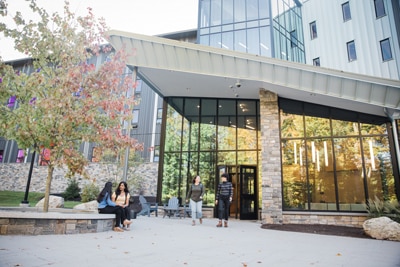Associate of Science in Finance New England campus experience

Program Overview Why get a finance associate degree on campus?
Are you interested in exploring a career in a high-demand field like management, finance, banking or accounting? Then, an Associate of Science (AS) in Finance from Southern New Hampshire University might be the right degree for you. In our on-campus program, you'll develop leadership principles and business skills that can apply across industries in a variety of finance-related, entry-level roles. The AS in finance could also be a great fit if you're planning to continue your business education in the future.
Skills you'll learn:
- Financial and accounting techniques
- Managerial strategies
- Data analysis and solution development
- Application of regulations and industry guidelines
- Financial document preparation
- Ethical accounting principles

Courses & Curriculum Make your degree count with on-campus finance courses
The curriculum for our 60-credit associate degree in finance offers hands-on, project-based courses that focus on helping you develop foundational business skills while diving deeper into specialized topics like corporate finance and investments. Small class sizes allow you to interact with your classmates and work directly with experienced faculty mentors. Plus, the credits you earn from your associate finance degree at SNHU could transfer into a campus-based bachelor's degree in accounting and finance, economics and finance or business administration.
Learn from instructors with industry experience
Our faculty members bring with them decades of knowledge and experience in business and finance. They look forward to supporting your journey in the classroom and as you work toward a career in your field.
Steven Gallaher
Position
Associate Professor
Education
- PhD in Finance from the University of Texas at Austin
- MBA in Finance from the University of Texas at Austin
- BS in Mathematics from the University of Texas
Greg Randolph

Position
Professor, Department Chair (Finance and Economics)
Joined SNHU
2007
Education
- PhD in Economics from West Virginia University
- BA in Finance (economics minor) from Grove City College
With public economics as his primary research field, Dr. Greg Randolph's current research projects include examining the impact of federal regulations, evaluating the criminal justice system and exploring the use of media to teach introductory economics courses. His publications include articles in the Journal of Institutional Economics, Business and Politics and Economics and Politics. He has also served as the co-editor of "Entrepreneurial Action, Public Policy, and Economic Outcomes" and "Public Policy, Productive and Unproductive Entrepreneurship" with Robert Salvino and Michael Tasto.
Campus major courses
You’ll take major courses that provide you with a solid foundation in your area of study – in some cases featuring experiential or project-based learning opportunities, labs, simulations and internships. These courses will allow you to learn a wide variety of topics and help prepare you for a role in your desired field.
Courses may include:
Visit the course catalog to view the full AS in Finance curriculum.
Campus general education courses
All undergraduate students are required to take general education courses, which are part of SNHU's newly redesigned program, The Commons. The goal of The Commons' curriculum is to empower you with some of the most in-demand skills, so you can succeed not only in your academic career, but in your personal and professional life too.
Courses may include:
Can’t wait? You don’t have to!
Apply now if you’re ready, and have your decision within 30 days. Or, schedule a visit and come see us in person!
Have questions? Visit our Contact Us page.
Career Outlook What can I do with an associate degree in finance?
Earning an associate degree in finance can help you prepare for an entry-level position or growth in your current finance role. You could also continue your education at SNHU with our Bachelor of Science (BS) in Accounting and Finance. Either way, you'll have hands-on experience and skills to help you succeed, such as developing financial plans for clients, analyzing financial statements and applying compliant ethical and legal practices.
Career paths include:
- Accounting assistant
- Consumer loan specialist
- Billing specialist
- Bookkeeper
- Auditing clerk
Median annual salary for bookkeeping, accounting and auditing clerks in 2023, according to the U.S. Bureau of Labor Statistics.1
Projected number of job openings for bookkeeping, accounting and auditing clerks each year on average through 2033, according to the BLS.1
Understanding the numbers
When reviewing job growth and salary information, it’s important to remember that actual numbers can vary due to many different factors—like years of experience in the role, industry of employment, geographic location, worker skill and economic conditions. Cited projections are based on Bureau of Labor Statistics data, not on SNHU graduate outcomes, and do not guarantee actual salary or job growth.

Campus Student Experience So, what’s it like taking classes on campus?
When you choose an on-campus program at SNHU, you'll have opportunities for hands-on skill building in business and finance. You can participate in the Volunteer Income Tax Assistance (VITA) program, providing free tax help to the community, or network with local and regional professionals at the Meet the Firms event in the fall. Either way, you'll have the chance to get involved and give back - and learn even more in the process.

Student support
At SNHU, you don’t have to do this college thing alone. You’ll have help from your advisor, access to tutoring and office hours, career coaching, and mental health services so you can do your best and feel your best.
Additionally, our Office of Diversity and Campus Accessibility Center make campus a safe place for everyone. Visit our Student Services page to learn more about our support offerings.

Small class sizes
With an average class size of 15-25 (depending on your major) you’ll learn in an environment where professors with real world experience know you by name.
Here, you’re not getting lost in giant lecture halls, but instead, actively participating in thoughtful dialogue where you’re always encouraged to collaborate with your peers and ask questions when they arise.

State-of-the-art facilities
Our 300-acre campus has everything you need. From technology-advanced classroom settings to your dorms complete with fitness centers and hangout spots, our goal is to give you the best college experience possible.
Whether you’re learning in a classroom, in a lab, on the field, or in your field, you’ll have what you need to be successful from the moment you wake up to the moment you close your textbooks.
School of Business Learn about the School of Business
In the School of Business, you’ll tackle real-world business challenges with the help of your experienced professors. From interning with local sports teams to learning the ins and outs of starting your own business, you can hone your skills through peer collaboration, case studies and participating in business competitions. Whether you’re focusing on an organization’s finances, marketing, technology or leadership, you’ll get firsthand experience from day one.
Business simulations
Sales immersion lab
Pitch competitions
How SNHU makes college affordable
At Southern New Hampshire University, we're on a mission to make high-quality education more accessible with more affordable tuition. With 70+ career-focused majors, state-of-the-art facilities, D2 sports and over 70 student clubs and organizations, you can get the campus experience you've always dreamed of at a more affordable price.
Transfer up to 45 credits toward your associate degree program at SNHU. If you’ve taken one course or many, we’ll evaluate them for you.
Fill out the FAFSA to see if you’re eligible for grants or work-study. (You could also be offered loans, though you’ll have to pay those back later.)
Getting free money for college – from SNHU or an outside organization – could help you save hundreds or even thousands of dollars.
Our collaborative partnerships with high schools enhance academic opportunities and college accessibility for some high school students.
Hear from us

Greg Randolph, Professor, Department Chair (Finance and Economics)
Accreditations
SNHU is accredited by the regional accreditor the New England Commission of Higher Education (NECHE). The university also carries specialized accreditations for some programs.

Sources & Citations
1Bureau of Labor Statistics, U.S. Department of Labor, on the internet, at https://www.bls.gov/ooh/office-and-administrative-support/bookkeeping-accounting-and-auditing-clerks.htm (viewed July 15, 2024). Cited projections may not reflect local and/or short-term economic or job conditions and do not guarantee actual job growth.
Your dream school is waiting
Apply now or schedule a visit today.


